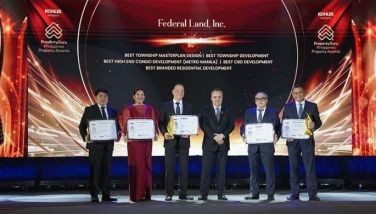Getting to know Executive Secretary Jojo Ochoa
MANILA, Philippines - Don’t call him the “Little President” and don’t expect him to dye his hair. You can, though, expect him to be more visible and more open to meeting with media.
Executive Secretary Paquito “Jojo” Ochoa Jr. abhors being in the limelight but does not have much of a choice now that he has assumed the position of “alter ego” of President Benigno Aquino III. He is also uncomfortable with the attention and VIP treatment he is accorded these days but says, with an uneasy air of resignation, he is learning to live with it.
Ochoa admitted to Malacañang reporters during a fellowship dinner he hosted the other night that he intentionally evaded the media when he was named executive secretary, going so far as checking out where the media were congregating so he could sneak away from them.
Curiosity about the man chosen to watch President Aquino’s back is probably so intense because the public really does not know who he is. In his own words, people must have thought: “Who that?” when he was finally introduced by the President as the lawyer-friend who would be his No. 1 alter-ego.
But Ochoa is no stranger to the President, and that is key to his role in the new government. They had known each other since they were young – “when our haircuts were both chato,” he laughs – because their fathers, also their namesakes, were allies in the Liberal Party.
According to Ochoa, then Sen. Ninoy Aquino Jr. was attending the birthday party of his father, former Pulilan Mayor Paquito Ochoa Sr., in Bulacan when the Plaza Miranda bombing on Aug. 21, 1971 occurred. He says this was the reason why Ninoy was spared and not because he was told about it, or even planned it, as alleged by the martyred politician’s critics and enemies. The bombing occurred during the party’s rally at Plaza Miranda in Quiapo, Manila. In a cruel twist of fate, Ninoy was assassinated exactly 12 years later at the Manila International Airport upon his arrival from self-imposed exile in the United States.
While Ochoa is learning to loosen up with media, even trying to be the comic when introducing himself to the crowd, it was obvious that he was nervous and awkward. During our reluctantly granted interview, he found it disconcerting having to pose for our photographer. “Paano ba?” he asks.
“Tama na nga ‘yan (That’s enough),” he finally tells our photographer when he noticed that the camera was still clicking.
But despite all the hassles that go with being one of the President’s most trusted men, Ochoa says he was in for the job because of his belief in his friend. He stresses that, like Aquino, he would only need to think of the people before making a decision and he would never go wrong. Asked what his marching orders were, he quips: “None,” and follows with a laugh.
He is happy with the overwhelming mandate that Aquino received from the Filipino people and he believes they would have to give back through worthwhile projects and programs.
Ochoa had organized other lawyers to support the Liberal Party’s standard-bearer. He explains he had to get those from the provinces because “they are the toughies in their respective areas, no matter how popular some lawyers are in Manila.”
The lawyers helped not just in the campaign but also the protection of votes for Aquino. He also took charge of the candidate’s schedules, even as he continued helping him with the legal aspects of his job, something he had been doing since Aquino became congressman of Tarlac. Mr. Aquino earlier disclosed that Ochoa did not ask for legal fees and only later did he pay him a retainer.
By the time Ochoa joined Aquino’s camp, he was already an established lawyer, having served as vice president of the Bulacan Chapter of the Integrated Bar of the Philippines and also engaged in private practice as partner of the De Mesa and Ochoa Law Offices. He is currently partner on leave in the Marcos Ochoa Serapio Tan (MOST) Law firm.
The Executive Secretary says he would draw from his experience as Quezon City administrator, a position he was appointed to by former mayor now congressman Feliciano “Sonny” Belmonte Jr. in 2003 after he headed his legal team in 2001.
He made a big difference in generating revenues for Quezon City and spending its funds prudently. He cut red tape and improved basic services despite obstacles he faced, including death threats. “Government work is no joke, you have to deal with different people and different interests,” he points out.
In the national arena Ochoa admits his work would now be of a “bigger magnitude” but that he was taking things in stride, facing them one at a time.
The President has said that one attribute he likes about Ochoa is the fact that he can humbly and honestly say he does not know everything and will study first before answering his queries.
Ochoa says the position of executive secretary is powerful because of the quasi-judicial nature of the office, where decisions in the departments could be appealed.
“It’s just like in the courts. In government, you have to exhaust all administrative remedies first before you can take any legal action,” he explains.
His office also has a say on the people who will comprise the executive branch and Ochoa admits appointing individuals who would fit perfectly for the positions in government was not easy. They need to convince competent and professional people to join the government to improve the quality of the bureaucracy. “It’s not all political considerations,” he says.
Those who know Ochoa describe him as a “behind the scenes guy” who is most of the time mistaken for a snob.
“That usually is the impression,” he admits.
But Ochoa says he would try to hold media briefings more often, especially when there are important announcements to make or policies that should be disclosed. But he would have to be very careful though.
“Everything that I do, more than anyone else, would show the President’s position too. What I do reflects on him directly. Maybe on the part of the Cabinet secretaries, that can be deflected a bit, but in my case, it’s him, right?” Ochoa tells reporters.
He says he was being cautious so not to put Aquino in a compromising situation. He also believes that “less talk, less mistakes.”
Ochoa, who like his boss is 50, says it is different being a friend of the President and being his alter-ego.
“It takes a while to know what he wants and what he does not. He, too, will eventually learn what I don’t want. If I face the media often, he might know me more through the media rather than us being together at work,” Ochoa parries.
“So that’s what I’m careful about, there’s no room for error, for ‘I am sorry.’ But I’m really not comfortable yet and I am still not abreast as to what I should and should not say before the media.”
He emphasizes that less talk would be better because he would surely commit some mistakes if he would keep talking to media.
“If I do that everyday, it’s already posturing, right?” Ochoa asks, adding, “And I don’t like preempting anyone. That’s arrogance.”
Ochoa says it will take time before he gets used to the attention – if ever he gets used to it at all. He has no plans of dying his hair, even if it makes him look older in photographs.
“The word pa lang na ‘ambush,’ nakakatakot na ‘di ba (Even the word ‘ambush’ is already scary),” he says, referring to ambush interviews.
At present, his security detail “is only one and a half,” and notes that this would be part of the change in his lifestyle, which would also mean less time for the family.
“That’s part (of the sacrifice). Time for family (really suffers),” he says. He likewise shares that he was now receiving more than 500 text messages a day and could not figure out how he could reply to all of them. “Send me your business cards so I’ll know who I am ignoring,” he laughs.
He concedes that the campaign promises were big time and would require a major change in culture and in everyone. “Everybody would (have to) cooperate. If the (people) will oppose and criticize every little step, nothing will happen, all we will be doing is parrying these criticisms.”
Many people were supportive of Aquino and they would now also reach out to opponents during last elections to make them feel that the President “is for everyone, not just for his allies.”
Ochoa points out that people need to understand that the changes would happen through long-term plans and not short-term programs.
“You treat the ‘routinary’ (in government work) as ‘routinart’ but there are special cases – (you think about) what is ideal, what is doable. The campaign promises require cultural changes, in the attitudes of people, in the attitude of the bureaucracy, it’s everybody in this country. I hope that is the motivation when they voted for him,” Ochoa says, because for him, the changes that people are hoping for were the reasons why he campaigned for Aquino and is staying to help achieve the dream of a new and better coountry.
- Latest
- Trending
















